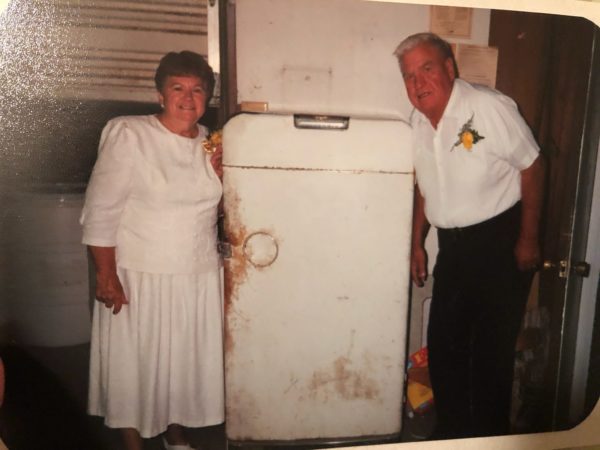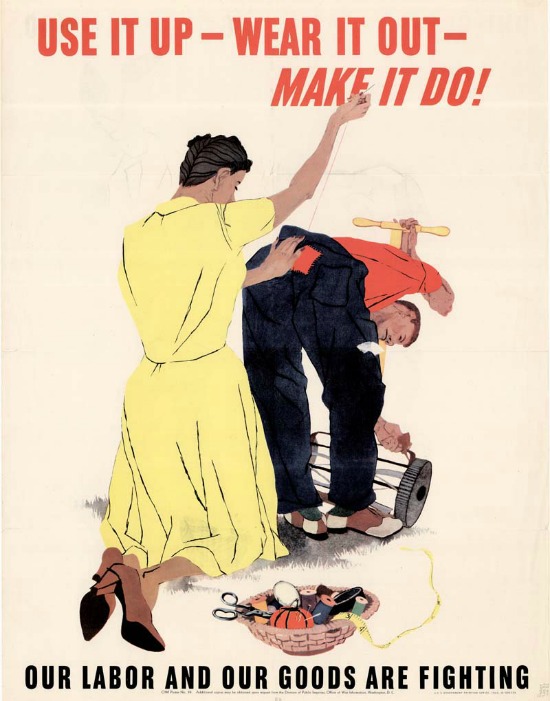At 90, I remember the "Dust Bowl" in the middle of the "Great Depression". As a boy, I earned a Nichol for each bushel basket of Mesquite Beans I picked off the ground under a thorny tree, from among the grass burrs, for cow feed. I'm not afraid of poverty. I've already read that book. Nearly everybody was poor back them, and envied the few rich people ... but did not hate them. The poor were frugal, worked hard, saved and prayed for better days, and many succeeded in learning contentment while improving their lot. It was a common attitude among the people in Sweetwater, Texas ....
Use it Up, Wear it Out, Make it Do, or Do Without
In the WWII era of Victory gardens, saving kitchen grease, and donating scrap metal for munitions, the frugal slogan “Use it up, Wear it out, Make it do, or Do without!” became a nationwide mantra.
Oh, how that has gone out the window today! Instead of using things up, we buy multiples in every color, style, model, and flavor. Instead of wearing things out, we throw them out (or they collect dust in our closets). Instead of making do, we make a fuss about how rough we have it. Instead of doing without, our credit cards are maxing out.
Our frugal forebears would be appalled by our wastefulness.
Getting back to our roots by learning to “Use it up, Wear it out, Make it do, or Do without!” will challenge our current frugal (or not-so-frugal) habits. While we won’t all go to the same extremes to save a buck, learning to work with what we have and not be wasteful can help us all to be more frugal.
Let’s take a look at what we can learn from this frugal mantra and how we can apply it to our current situation and upcoming purchases.
Use It Up
My kids are always amazed at how I can always squeeze one more blob of toothpaste out of the tube. Leaving the near empty bottle of shampoo upside down always nets another day’s hair-washing. With the help of a spatula (Mike calls it a “rubber scraper”), you’ll get another sandwich of peanut butter out of an empty jar. Does anyone else avoid the last two slices of bread in the loaf?
Whether it’s food, toiletries, or another limited resource, we probably all have room for improvement when it comes to “using it up.” Maybe it means keep the fridge more organized so produce and leftovers aren’t wasted. Maybe it means making an extra effort to teach kids to not let their eyes get bigger than their stomachs. Freezing leftover vegetable scraps is great for stew. Pressure cooking chicken or turkey bones makes great broth. Getting in a better habit of “using it up” will save us money and help us raise a less wasteful next generation.
My grandma is a frugal role model for me. Not only does she make use of everything as it was originally intended, she is a champion of reusing and repurposing things. While I spoil myself with nice food storage containers that I love, my grandma keeps reusing cool whip containers, pickle jars, and butter tubs. She saves the string, twist ties, and rubber bands from packages. If foil is still clean it can be used again.
Wear It Out
On their 50th wedding anniversary, my grandparents posed for a picture with the refrigerator (still working!) that they received as a wedding present. It’s still going strong out in their garage. It’s pretty safe to say that none of the fridges we are using today will be around in fifty years!

With most current appliances and electronics being built for for a shorter expected life span, it shouldn’t be too hard to “wear it out.” On the one hand, manufacturers really “just don’t make ’em like they used to.” On the other hand, how often do we replace something because we lack the self-control to hold on to “just fine” when new models and updates keep rolling out.
When it comes to clothes, my in-laws are the epitome of “wear[ing] it out.” When their clothes start to show significant wear, they are designated as clothes for working in the garden or other dirty tasks until they are completely demolished.
It’s understandable that not everyone (including me) wants to wear all of their clothes for decades until they are absolutely threadbare. There are lots of frugal alternatives for clothes, from passing them onto a friend or donating them to a thrift store, to selling them on ThredUp, eBay, or locally.
Make It Do
“Need” is a very relative term. Almost every time that we (myself included) say that we “need” something, we would probably be fine without it. Sometimes we just might have to be a little more creative when it comes to a work-around. Not only does making it do build our character, we’re also saving money and getting ourselves closer to our financial goal.
My grandma’s antique fridge that’s still keeping food cold after 60+ years, lost its handle a decade or two ago, but that wasn’t a reason to get rid of a perfectly functional fridge. With a skilled hand and a screwdriver, the door pries open just fine.
Just to be clear, I’m not saying that you never buy anything new (or new-to-you). What I am saying is that too often we don’t exercise any restraint or creativity when we “need” something. Next time you “need” something, try to think of how you can “make do” with what you already have!
Do Without
Even considering the things we all cut out in the beginning of the Frugal Fresh Start Challenge, we really don’t “do without” the way our grandparents had to, or most of the world still does. We’re pretty spoiled. Considering you’re reading this on some electronic device, probably in your own home, vehicle, or workplace, I feel safe including you among the spoiled.
If we’re worried about keeping up with the Jones, going without will make us miserable. Focusing on our blessings and considering all we do have makes going without easier. Going without can be good for us and good for our kids. Are there some luxuries that you normally buy or were planning to buy that you could do without?
Challenge—Day 17
Give a second thought to upcoming purchases that are on your “to buy” list. Think about how you are managing without that item now. How can you “Use it up, Wear it out, Make it do, or Do without!” Could you make it do or do without until you reach the goal you set? Could you hold off and make that purchase part of your celebration for reaching a milestone?
- What are some of things that you are intentional about using up or wearing out?
- How have you made do or done without?
- Do you have a grandparent or frugal role model who exemplifies this frugal mantra?



No comments:
Post a Comment